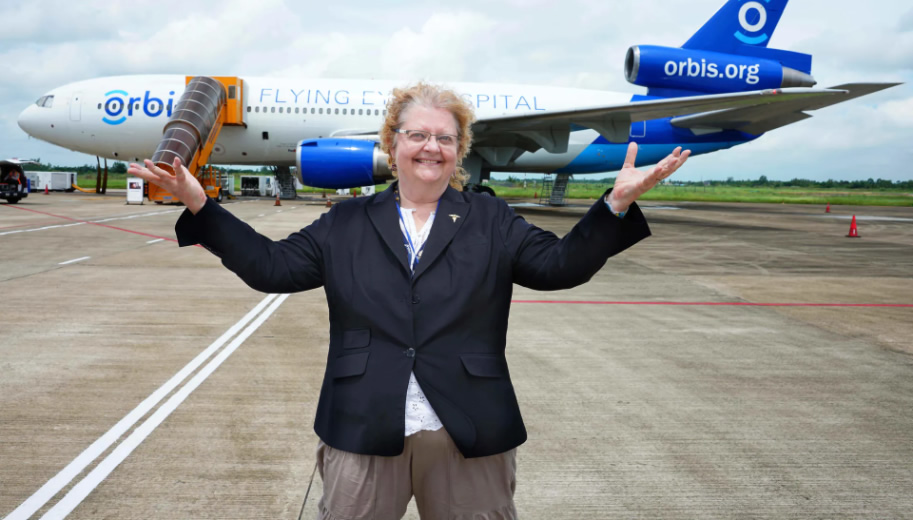Rosalind Stevens, MD
Orbis missions are her passion

Vitreoretinal surgery, medical retina and retinopathy of prematurity specialist, Rosalind Stevens, has been volunteering with Orbis for almost 30 years and is one of their longest-serving Volunteer Faculty members. She has served as the Medical Director of the Flying Eye Hospital in China, Indonesia, India, Bangladesh and Cuba, training ophthalmologists in over 30 countries from Myanmar to Mongolia and counting! She is especially proud of her role in helping to design patient care areas and operating facilities for the new MD-10 Flying Eye Hospital, which is currently functioning as a mobile simulation training venue for hands on skills transfer of ophthalmic skills.
In 2011, she told Dartmouth Medical Magazine that traveling for Orbis International “is my real hobby, because for me it’s fun.”
When she’s not traveling the world sharing her skills, Dr. Stevens is Professor of Surgery Emerita at the Geisel School of Medicine at Dartmouth, New Hampshire, and in clinical practice as a Vitreo-retinal specialist in Ophthalmology. She was Chair of Ophthalmology at Dartmouth for ten years. With 42 years of practice, Dr. Stevens is also a mentor examiner of the American Board of Ophthalmology and has received the American Academy of Ophthalmology achievement award.
She is married to John Cavender, MD, who completed his residency at Pacific Medical Center under Arthur Jampolsky as Chair, followed by a Retina and Ophthalmic Pathology Fellowship at Bascom-Palmer Eye Institute in Miami under the leadership of Edward Norton, MD and Victor Curtin, MD. He subsequently joined the Faculty of PMC from 1973 – 82, training the residents in Medical Retina and Ophthalmic Pathology.
Roz Stevens received her MD from the University of Illinois in Chicago in 1978, completing her residency at Pacific Medical Center, San Francisco, California, under Robert Stamper as Chair, going on to Retina fellowships at The Wilmer Institute of Johns Hopkins University, and Emory Eye Center, Atlanta, Georgia. She subsequently received her MPH from the Bloomberg School of Public Health at Johns Hopkins 10 years ago, with a concentration in International Health.
According to Orbis, many of their global training projects have benefited from her skills & expertise as a teacher and trainer, including the Rwanda International Institute of Ophthalmology in Kigali and in 2017, the Can Tho Eye Hospital and Can Tho Children’s Hospital in Vietnam working alongside local physicians to improve the neonatal care of premature infants.
Commenting on her experience on the Retinopathy of Prematurity project, she says: “One of the striking things I’ve noted this week in the training is that when I first came to Vietnam in 1997 the neo-natal units had three or four babies per incubator – and many of the babies were receiving 100% oxygen which turns out to be rather toxic to the retina. Since then, there has been an aggressive effort to improve neonatal care in the intensive care unit.”
“Today, when we toured the Can Tho General Hospital we could see each baby had an individual NICU bed, and we saw additionally during the eye screening that the level of ROP was not nearly as severe as that we had observed eight to ten to fifteen years ago. “So, I can say that from a biologic and clinical point of view, the disease of ROP – although still very serious – is much improved. We hope to work with our partners here in Can Tho during this week – as well as with other retina specialists across Vietnam – to prevent blindness from ROP over the near term.”
Reflecting on her fifth time in the Rwandan capital, Kigali, and the 4th year of leading an Orbis-supported Medical Retina Skills Course at the Rwandan International Institute of Ophthalmology (RIIO), she explains what inspires her to come back and keep teaching saying, “I keep returning to teach this course with Dr. Ciku Mathenge as I believe in its purpose to provide essential medical education to mid-career African ophthalmic teaching faculty who have gaps in their training. Plus, we have started to see results! Last year in Malawi I saw residents using indirect ophthalmoscopes in their clinic one year after we trained their Chief in our Kigali program!”
Talking about the program’s ultimate goal, she says: “Although we have asked the new residents to listen to some of our lectures, our main purpose is training non-Rwandan mid- career ophthalmology faculty from other sites in Africa to establish a training center of excellence and develop the medical retina training faculty across all residency programs.” adding: “To date we have trained physicians from Kenya, Malawi, Uganda, Tanzania, Burundi, Nigeria and South Sudan.”
While Dr. Stevens is no stranger to the Orbis training programs, she relishes the opportunity to train teams in a hospital setting. “I spend much more contact time with the trainees as there is generally much less time spent in transport from home base to teaching venue. There is generally a less crowded environment which makes communication with the trainees easier. Also, in the typical hospital setting one is working in the everyday milieu that the trainee works in so it’s more realistic from their point of view.”
